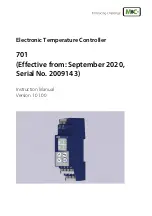
FCM 300 Series
MG.03.B6.2G - VLT is a registered Danfoss trademark
Parameter Group 5: Serial communication
520 Data read-out: Current
(MOTOR CURRENT)
Value:
XXX.XX A
[XXXXX]
Function:
This parameter can be read out via the serial
communication port.
Description of choice:
The value shown is a calculated value of the given
motor current.
This value is updated every 320 ms.
521 Data read-out: Torque
(TORQUE)
Value:
XXX.X %
[XXXX]
Function:
This parameter can be read out via the serial
communication port.
Description of choice:
The value shown is the torque, with sign, supplied
by the motor shaft. The value is given as a
percentage of the rated torque.
There is not exact linearity between 160% motor
current and torque in relation to the rated torque.
Some motors supply more torque than that.
Consequently, the min. value and the max. value will
depend on the max. motor current as well as the
motor used.
This value is updated every 320 ms.
✭
=
General factory setting - also applying to spare part unit, H
H
H
H
H = HVAC setting, IIIII = Industrial setting, ( ) = parameter
window text. [ ] = value for use in communication via serial communication port
522 Data read-out: Power, kW
(POWER (kW))
Value:
XX.XX kW
[XXXX]
Function:
This parameter can be read out via the serial
communication port.
Description of choice:
The value shown is calculated on the basis of the
actual motor voltage and motor current.
This value is updated every 320 ms.
523 Data read-out: Power, HP
(POWER (hp))
Value:
XX.XX HP (US)
[XXXX]
Function:
This parameter can be read out via the serial
communication port.
Description of choice:
The value shown is calculated on the basis of the
actual motor voltage and motor current. The value
is indicated in the form of HP.
This value is updated every 320 ms.
13-5
Description of choice:
The value corresponds to the present output
frequency f
M
multiplied by the factor preset in
parameter 008
Display scaling
of output frequency.
NOTE!
If the setting of the motor parameters does not
match the motor applied, the read-out values will be
inaccurate and may become negative, even if the
motor is not running or is producing a positive
torque.
















































